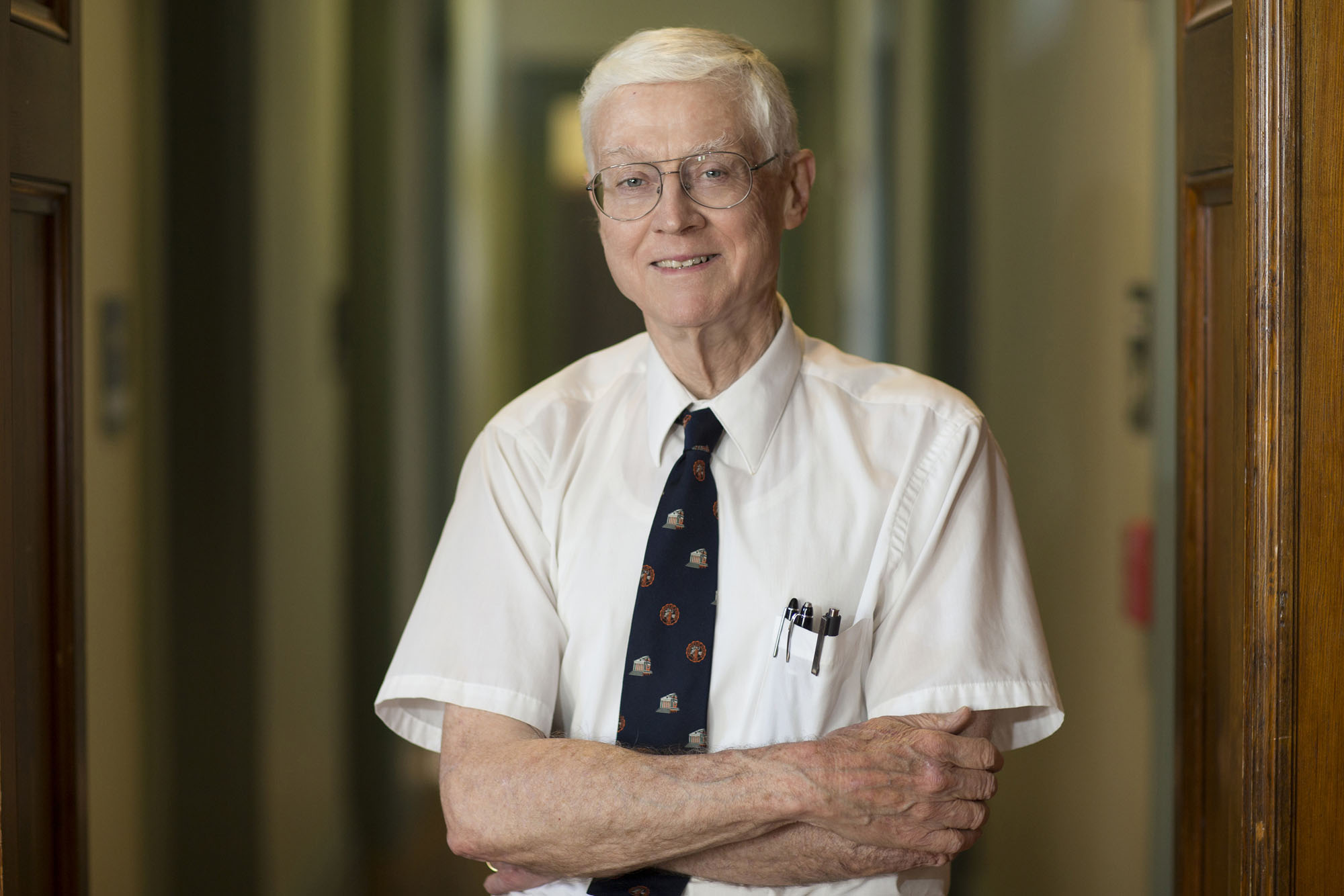Raised in the country outside of Bountiful, Utah, University of Virginia philosophy professor James Cargile had never been east of the Mississippi before he joined the Army in 1958.
This spring, even as Cargile celebrates 50 years of teaching with the University, he still remembers the culture shock of his first arrival in Charlottesville as a graduate student in 1960.
“I was walking up from the train station and had walked up past the Rotunda when a Cadillac convertible pulled up with young people in formal attire. This was in the middle of the day,” Cargile said. “They got out and were pouring champagne into very fine glasses and I just stood there and stared.”
Over the last half-century, Cargile has seen great change at U.Va. His first impression of restricted privilege quickly faded as he watched the University evolve into a more inclusive and higher-reaching institution.
“The University has become considerably more diverse, and that’s a very good thing,” Cargile said. With a smile he added, “and the average grades have also increased greatly.”
After receiving his master’s in philosophy at U.Va., Cargile left to earn his Ph.D. from the University of Cambridge. He couldn’t stay away for long. He returned as a professor in 1965, just in time to bear witness to some momentous events.
In 1970, protests against the Vietnam War reached a boiling point on Grounds when word came that four students were shot at an anti-war demonstration at Kent State University in Ohio. Despite the growing tension, then-U.Va. President Edgar Shannon ordered classes to remain in session and urged faculty members to follow his own example and speak directly with protestors.
“I used that time to talk with the students,” Cargile said. “I also said that skipping my classes was probably not the best way to help their cause.”
In that instance and in the many years that followed, he has worked to help students reach their own conclusions about the world around them. With the exception of advising on courses of study, Cargile has an almost reflexive skepticism toward giving advice, preferring instead to prod students forward using the Socratic method.
“Any guidance I’ve given would be generic,” Cargile said. “I don’t give specific advice.”
This strategy of engaging directly with students and focusing on their needs is a long-standing pattern for him. In addition to continuing his own research, Cargile often teaches four courses a semester and holds 12 office hours a week – which fellow U.Va. philosophy professor Paul Humphreys called “amazing.”
Further, “he doesn’t use teaching assistants,” Humphreys said. “He does all of his own discussion sections and grades himself.”
This close engagement is one of the reasons that Cargile is highly regarded among students as well as faculty. Although he teaches subjects, like symbolic logic, that are often considered dry, his courses are very popular and receive rave reviews from students.
Cargile sees a greater reward for the additional in-person interaction.
“I learn a lot from my students all the time,” he said. “They’re very interesting people. They regularly surprise me, even though I constantly go over problems that are very familiar to me. They say things about them that I hadn’t thought of.”
At a recent departmental celebration in Cargile’s honor, one alumnus returned to pay tribute to his former professor’s work. Gene Mills, now a professor of philosophy at Virginia Commonwealth University, gave a speech entitled “Cargile vs. Cargile.” After comparing and contrasting how his mentor’s views have changed over time, Mills said that one constant of Cargile’s career is his commitment to helping others achieve success.
“Jim has this terrific combination of having extremely high standards – he is very demanding – while providing extreme encouragement,” Mills said. “He is very generous with his time and will work with you on something until you get it.”
In fact, generosity of spirit is a common theme whenever Cargile’s colleagues are asked to describe him.
“Jim is marvelously sensitive to the welfare of others,” philosophy professor Brie Gertler said. “He is the sort of person who invites newly arrived junior professors and visiting scholars to Thanksgiving dinner.”
Cargile is also a driving force behind the philosophy department’s annual retreat to Blandy Farm. They are the only humanities department to hold such an event and he sees it as a valuable asset.
“The facilities are adequate, but not lavish, and everyone is forced into close quarters, requiring a cooperative effort at cooking and cleanup,” he said. “This promotes community among the participants and strengthens collegiality in our department.”
It’s become a tradition for Cargile to wake the other participants each morning by playing his fiddle outside the farm windows. His presence and the relaxing atmosphere he brings to the outing are the main appeal for many of the department’s attendees.
“When I am busy with my personal and professional life, I sometimes doubt whether I should really take the time to attend the retreat,” Gertler said. “It is fondness for Jim that compels me – and many of my colleagues – to go.”
As such an integral part of the philosophy department, Cargile’s fellow professors will be glad to know that he has no immediate plans to retire. With 50 years of service under his belt, he is taking next year off to focus on writing, but hopes to return and continue teaching for several years after that.
Outside the University, Cargile is an active member of the Charlottesville community. He volunteers one day a month serving dinner at the Salvation Army, treating guests to homemade meatloaf and buttered parsley potatoes. He is also an avid runner and regularly volunteers to help at local races like the Charlottesville Women’s Four-Miler.
Considering his long devotion to U.Va., it is fitting that Cargile shares his birthday with Thomas Jefferson. Born 195 years after the University’s founder, Cargile’s long career stands as an important pillar in Jefferson’s Academical Village.
Media Contact
Article Information
May 7, 2015
/content/life-s-work-philosopher-celebrates-50-years-serving-students-colleagues

